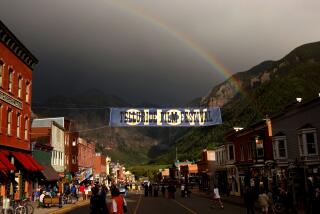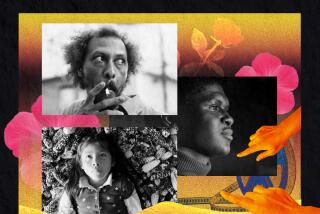Israeli film festival reflects that nation’s diverse cinematic universe
Israel’s film industry is burgeoning, with films in greater number and quality coming out of the country and finding international releases. That thriving industry, and the ever-more diverse group of filmmakers within it — including a number of women directors — will be celebrated at the Israel Film Festival, opening Wednesday in Los Angeles.
IFF founder and executive director Meir Fenigstein said he aims to highlight the many new voices during the two-week event.
“There’s almost no old-timers making movies [in Israel],” Fenigstein said. “All young, new directors, and each of them are doing different topics.”
Several of those directors are now finding their big break, but also in the IFF program is an established name familiar to American audiences: Natalie Portman, making her feature directorial debut with the Hebrew-language “A Tale of Love and Darkness,” based on a novel by Israeli author Amos Oz. The Jerusalem-born Portman, who also stars in “Love and Darkness,” will receive the 2016 IFF Achievement in Film Award at the opening-night gala dinner.
Oscar-nominated actress Sharon Stone, who has done humanitarian work in Jerusalem, will be honored with the fest’s Career Achievement Award.
On Sunday at Laemmle Ahrya there’s a special screening of “Sand Storm,” noteworthy for its unique glimpse into Arab society within Israel: It’s the first time a film with entirely Arabic dialogue (rather than Hebrew) has earned the Israeli Ophir Best Film prize, which automatically becomes the country’s entry for the foreign-language film category at the Oscars. Its crew is made up of both Arabic and Jewish filmmakers.
Taking place in a remote Bedouin village in southern Israel, “Sand Storm” has shed light on Bedouin culture for both Israeli and international audiences unfamiliar with their traditionally nomadic lifestyle. Though producer Estee Yacov-Mecklberg notes of the film about forbidden love, “It’s a very universal movie. Even though it’s in Israel and it’s about the Bedouin, it [could take place] in Pakistan, in Iran, all kind of places that women are treated different.”
Yacov-Mecklberg will be in attendance at the festival, participating in Q&As for “Sand Storm” and for “A.K.A. Nadia,” about a woman who changes her identity from Arab to Jewish in order to return Israel after fleeing the country with a secret lover. Both features are directed by women, reflecting the growing number of working Israeli female filmmakers.
Israel’s New Fund for Cinema and Television’s Greenhouse Women program, providing grants and mentorships, is among the nation’s recent efforts to support women making films. Israeli filmmakers say the recent flourishing of the industry is in part owed to the 2001 “cinema law” that effectively tripled government funding.
As Israel’s filmmakers diversify, so do the stories they tell, though with some difficulty on the international stage, as foreign audiences have long paid more attention to the country’s films focusing on the Israeli-Palestinian conflict. “Lemon Tree,” “Waltz With Bashir” and two documentaries earning Oscar nods in 2013 — “5 Broken Cameras” and “The Gatekeepers” — all deal with the headline-grabbing conflict.
“We are tired of doing movies about this kind of a matter,” Yacov-Mecklberg admits, though her “Sand Storm” is an example of a story with a different focus breaking through. Ahead of its Ophir win, it picked up the World Cinema Grand Jury Prize at the Sundance Film Festival in January.
Other highlights in the festival program include opening-night film “The Women’s Balcony,” about a rift that develops between a community’s men and women after a catastrophe in their synagogue; “One Week and a Day,” a drama starring Shai Avivi, the actor sometimes called “the Larry David of Israel”; and “On the Map,” a documentary about the Tel Aviv basketball team’s triumph in the 1977 European Cup.
Some films in the program already have U.S. releases set. Others are hoping to find American distributors at IFF or via the American Film Market, which took place in Santa Monica just before the festival. Fenigstein secured a booth for the fest at AFM for the first time last year. He claims IFF has “brought more than 450 filmmakers in the past 30 years to America. I think we’re doing our share in getting America closer to Israel.”
30th Israel Film Festival
Nov. 9-23, 2016
Opening night at Saban Theatre, other screenings at Laemmle theaters
Admission: $45 on opening night, other screenings $10-$25
More info at www.IsraelFilmFestival.com
More to Read
Only good movies
Get the Indie Focus newsletter, Mark Olsen's weekly guide to the world of cinema.
You may occasionally receive promotional content from the Los Angeles Times.










